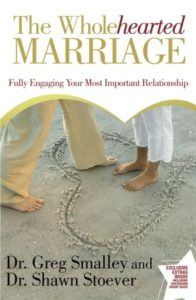Cultivating Friendship In Marriage
Marriage is an institution designed by God to fulfill some of his purposes. Throughout the Old and New Testaments, the marriage relationship is used to convey truths about our relationship with Jesus. The context of marriage originally referenced in Genesis was more than two individuals living together to form a lifelong union and produce offspring. God had other designs for this relationship as well. In this paper, we will consider one of these designs, friendship within the marriage.
Genesis 2:18-20 reads, “And the LORD God said, It is not good that the man should be alone; I will make him an help meet for him. And out of the ground the LORD God formed every beast of the field, and every fowl of the air; and brought them unto Adam to see what he would call them…but for Adam there was not found an help meet for him.” Multiple times throughout Genesis 1 God paused, looked over His creation and stated, “it was good;” yet in Genesis 2 He expressed “it is not good.” How was it not good? Here was Adam in the Garden of Eden with all its beauty, wonder, and breathtaking sights and sounds. It was perfect. Best of all, Adam had a perfect union with the Creator – yet it was not good! In paradise and yet feeling lonely? We know God himself is a triune and relational God, and we were created in his image. He designed us not only to have a vertical relationship with him but also horizontal relationships with other human beings.
Genesis 2:20 refers to Adam not having a “help meet.” The Hebrew word for “help meet” is ‘ezer, which means “helper-companion, aid.” The root word of ‘ezer’ is ‘azar’, meaning to “surround or protect.” It appears God’s intent was for Eve to be more than just a lover to Adam. The two would also be companions and friends. Proverbs 2:17 says, “Which forsaketh the guide of her youth, and forgetteth the covenant of her God.” The “guide of her youth” literally refers to this woman’s husband. The English word ‘guide’ means “intimate, friend” or best friend.
It is important to remember when the Bible speaks of friendship it is different than what is found in the world. Being a friend does not mean tolerating or ignoring wrong, sinful, or unhealthy behaviors. Being a friend means building a safe enough environment to allow confession of faults (Jas. 5:16), welcome times when the other lovingly points out areas of growth (Rom. 15:14) and encourage one another spiritually (Heb. 10:24). This requires consistency, transparency, humility, and a spirit of fondness for one another. Friendship in marriage is not only seeing the flaws, weaknesses, and shortcomings, but also getting excited about how the Holy Spirit works through our spouse to become who he or she is and will become through his power and grace. Similarly, Christ himself anticipates what each of us will become in him (1 John 3:2).
Building Friendship in Marriage
While effective communication and conflict resolution are critical to a healthy and God honoring marriage, so is the skill of developing and nurturing friendship. It is not uncommon for the development of friendship to be neglected in marriage. This can happen either through busyness or simply by not being intentional to grow this part of our relationship. Without intentionality, seemingly “good” activities can take away from the “great” opportunity for us to enrich our marriage relationship in the way God designed. As we consider ways to nurture friendship in marriage, keep in mind the different seasons of life. For example, expectations will look different for the couple with a young family compared to the couple that no longer has children living at home. It is important to talk together about realistic expectations. Regardless of stage, there are some practical ways this area of friendship can be fostered in marriage.
Knowing One Another
Fostering friendship calls us to an ongoing growth in our knowledge of one another. We are reminded God intimately knows and understand us and our needs (Mat. 6:31-32). Much time is generally spent early in marriage relationships on learning and being curious about one another. However, transitions and responsibilities begin to fill our lives. The effort spent learning about one another can be put on the back burner or stopped all together. This can be a detriment to marriage. The husband and wife are two unique individuals who process change, transitions, and stressors differently. Over time each one is growing and changing, and this provides the opportunity for spouses to continue to learn about each other.
Practical ways to grow in our understanding of one another:
- Meditate on Psalm 139 and consider all the ways God intimately knows us. Consider this scripture as a model for being curious and growing in your understanding of your spouse.
- Be intentional about setting aside time to spend together for the purpose of learning about each other.
o Set boundaries to minimize interruptions and eliminate problem solving.
o Focus on asking questions that require each of you to expound or tell a story.
o Consider asking your spouse about their ‘mountain-top’ and ‘valley’ experiences.
o Consider each other’s dreams and the legacy you would like to leave with your family.
Sharing Affection and Appreciation
Friendship in marriage includes an expression of our appreciation and affection for one another. Paul reminds us we are to be “kindly affectioned” to one another (Rom. 12:10). This affection and appreciation can decline over time through the stresses of life along with the friction of conflict or simply by taking each other for granted. We are called to love one another as we have been loved (John 13:34). As we are to rejoice and give thanks in our relationship with God, so it is also essential to rejoice and give thanks for the companion God has given to us. This experience strengthens our bonds, deepens our connection and provides “health [healing] to our bones” (Prov. 16:24).
Practical ways to nurture affection and appreciation:
- Read 1 Corinthians 13:4-7, translating each verse into an “I appreciate” statement for your spouse.
- Read Philippians 1:3-11 together and consider how Paul expresses appreciation and affection for the church at Philippi. Use this text as a model to express your appreciation (through word or note) to your spouse who has stood by you and supported you through good times and bad.
- Reflect on ways to sprinkle some fun and laughter into your relationship. This may mean being curious about what an experience may hold without placing unrealistic expectations on those moments.
- Be intentional about sharing special and fond memories together as a couple (trips, moments of deep joy and closeness with God).
Seeking to be Attuned in Small Moments
We are constantly making gestures to our spouse for support and emotional connection. These gestures can come in small or large ways. It is often easy to recognize the need for connection in the big things and overlook the importance of being attuned to one another in the small moments of life. We are called to “Rejoice with them that do rejoice, and weep with them that weep” (Rom. 12:15). This alignment in the small moments leads to building trust, emotional connection, and passion in relationships. It also creates a cushion in relationships during difficult times. Capitalizing on the small moments and interactions is far more important for relationships than a week-long cruise.
Practical ways to seek to be attuned with your spouse:
- Consistently schedule time to unplug from social media, news, and other distractions to focus on each other.
- Search for a plea for connection underneath your spouse’s negative emotions. Practice validating and coping with negativity by saying things like, “That sounds stressful,” or, “It makes sense that you are frustrated.”
- Write down five behaviors that would increase your spouse’s marital satisfaction if done consistently. Share this list with your spouse and see if it seems accurate. If so, commit to engaging in one behavior per week for the next five weeks.
- Find ways to be attuned to your spouse during the small moments in life. Growth and transformation begin with small changes. Some moments to consider are partings, reunions at end of the day, time for dates, and positive talk when you are apart. Additionally, seek to repair periods of disconnection or tension.
Conclusion
Cultivating friendship in marriage takes purposeful and intentional action. Though challenging at times, it pays great dividends. Deepening friendship in marriage glorifies God, strengthens our connection and fosters spiritual growth. Commit to a time to discuss ways you can practically cultivate friendship in your marriage.
To view the complete PDF, click here.
For Further Information:
Tips for Increasing Emotional Intimacy
This blog post provides five tips for increasing emotional intimacy in your marriage. [Symbis]
 The Wholehearted Marriage: Fully Engaging Your Most Important Relationship
The Wholehearted Marriage: Fully Engaging Your Most Important Relationship ![]()
Author: Dr. Greg Smalley, Dr. Shawn Stoever
Publisher: Howard Books
This book offers practical tools for helping couples keep a passionate connection with one another and understand the role their hearts play in their lives.
 SMART Love: How Improving Your Emotional Intelligence Will Transform Your Marriage
SMART Love: How Improving Your Emotional Intelligence Will Transform Your Marriage ![]()
Author: Dr. David Stoop, Dr. Jan Stoop
This provides some helpful concepts for improving emotional intelligence within marriage. SMART is an acronym for S = Self-Awareness, M = Managing Your Emotions, A = Accountability, R = Reading the Other Person’s Emotions, T = Together in the Land Emotions. The book introduces a given topic of the acronym in a chapter and the following chapter shares ten exercises to practice that particular principle within your marriage.





Comments
Leave a Comment